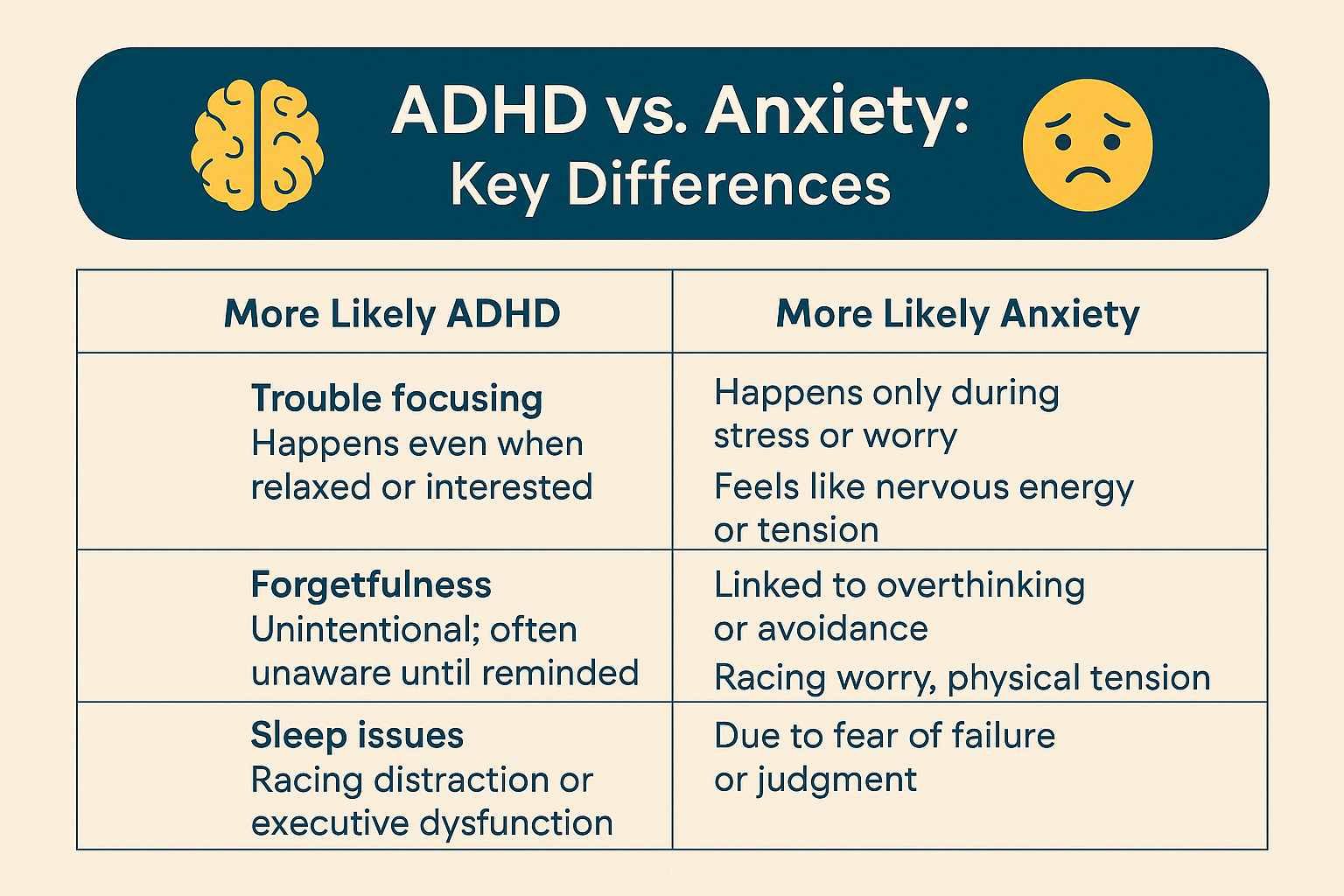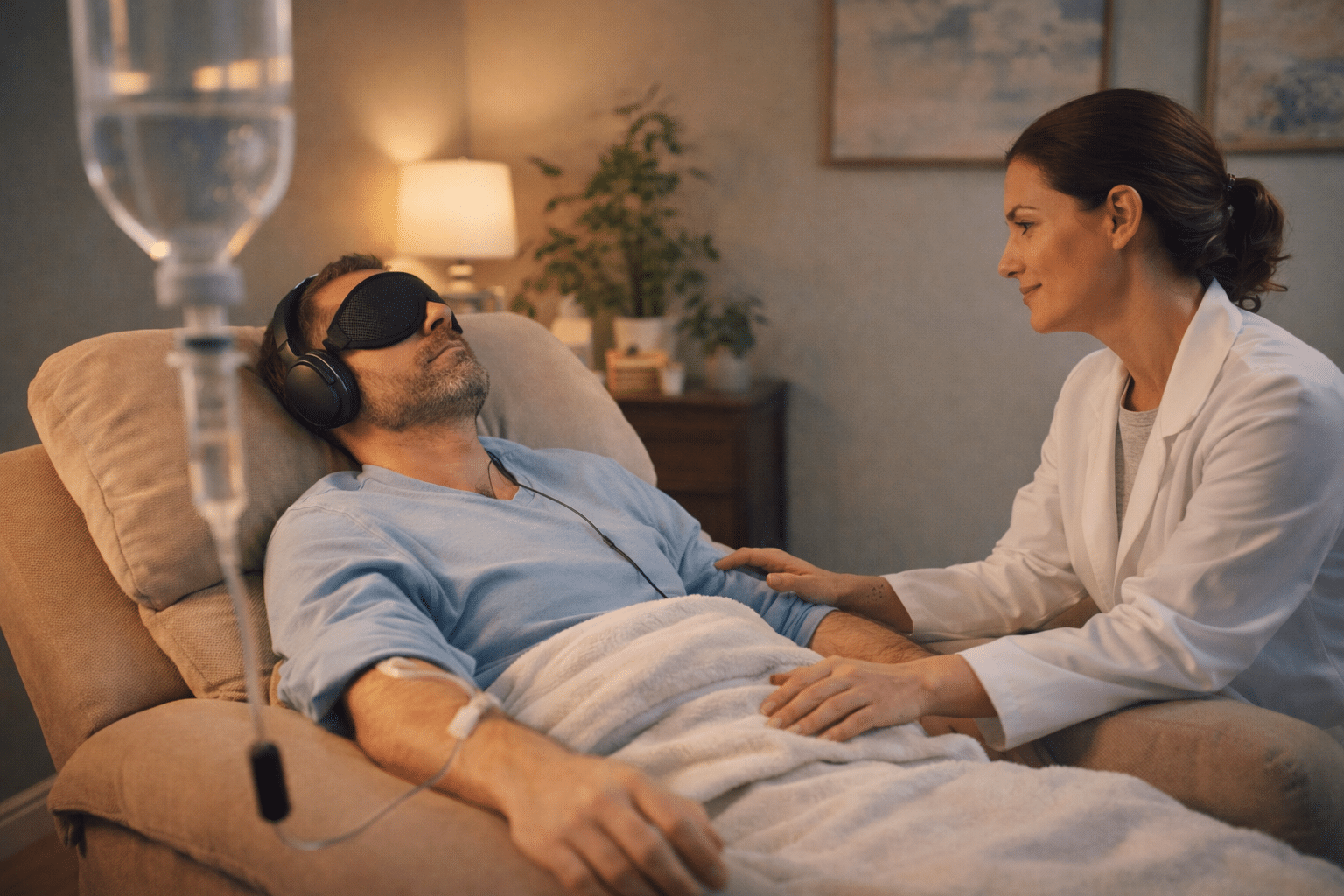You wake up already behind schedule. Your brain won’t stop running, and by midmorning, you’ve forgotten three tasks, missed one email, and feel like you’re sprinting in place. Is it anxiety? Or is it ADHD?
Many adults, especially women and high achievers, live with this daily mental overload, never quite sure what’s causing it. ADHD and anxiety can look remarkably similar, but they stem from very different brain patterns.
Getting the right diagnosis unlocks the right treatment. Without it, you might spend years targeting the wrong thing.
ADHD vs. Anxiety
Both ADHD and anxiety interfere with focus, cause restlessness, and increase emotional exhaustion. But how they do that is completely different.
ADHD is a neurodevelopmental disorder that affects attention, impulse control, and task management. You might drift off in the middle of conversations or get distracted mid-email, even when you want to pay attention. The problem isn’t nerves. It’s a short-circuit in how the brain filters and organizes information.
Anxiety, by contrast, is rooted in excessive worry. You might ruminate, overthink worst-case scenarios, or feel physically tense in specific situations. When focus disappears, it’s because your brain feels overwhelmed by fear or pressure.
The Overlap
Statistically, almost half of adults with ADHD also have an anxiety disorder. In one study, 47–53% of adults diagnosed with ADHD also met criteria for generalized anxiety, social anxiety, or panic disorders. The overlap is even more common in women, who tend to mask symptoms or internalize them as personal flaws.
For example, a woman might miss deadlines or forget appointments, then spiral into guilt and anxiety. The outside world sees someone with “stress issues.” But underneath, untreated ADHD may be the core issue.
In another study, researchers found that 80% of adults with ADHD also had at least one other mental health condition, with anxiety and depression topping the list. Yet most of those adults were undiagnosed or misdiagnosed until middle age.
The takeaway is that high-functioning adults can still have impairing ADHD. Without accurate ADHD testing in Sacramento or wherever they live, their symptoms may be written off as chronic anxiety or burnout.
Why Misdiagnosis Is Common
If you’re treated for anxiety but have ADHD, the results can be frustrating. You might feel calm after a medication but still struggle to organize your day. Or you might build coping tools in therapy yet still forget to use them.
One patient’s story from ADDitude magazine shared how a woman spent years on antidepressants and anxiety meds after having kids. She still couldn’t manage home life or stay focused at work. Only after her daughter was diagnosed with ADHD did she realize the same patterns in herself. One trial of Adderall and “years of anxiety and stress evaporated.”
This kind of delay is common. Many professionals dismiss ADHD in adults, especially if you’re doing well on paper. But under the surface, you may be spending triple the energy to hold it all together.
On the flip side, if you only treat ADHD in someone with severe anxiety, you might ramp up restlessness or panic. Anxiety treatment near you should address the emotional landscape directly, not just attention problems.
Misdiagnosis leads to more trial and error. More years feeling like you’re failing, when really, the system failed to diagnose you properly.
How to Tell the Difference
Let’s say you’re feeling distracted, tense, forgetful, and restless. How can you begin to tell what’s what?
Here’s a simplified lens clinicians use:
| Symptom | More Likely ADHD | More Likely Anxiety |
|---|---|---|
| Trouble focusing | Happens even when relaxed or interested | Happens only during stress or worry |
| Restlessness | Feels like boredom or urgency to move | Feels like nervous energy or tension |
| Forgetfulness | Unintentional; often unaware until reminded | Linked to overthinking or avoidance |
| Sleep issues | Racing thoughts, poor routine | Racing worry, physical tension |
| Procrastination | Due to distraction or executive dysfunction | Due to fear of failure or judgment |
Still, a checklist isn’t enough. Diagnosis requires trained observation and the right tools. When you visit a mental health clinic near you, clinicians should use interviews, rating scales, and objective tests to clarify what’s going on.
What Happens When You Have Both?
ADHD and anxiety together can intensify each other. ADHD may cause forgetfulness or missed deadlines. That triggers anxiety about being unreliable. Anxiety then fuels insomnia or panic, which worsens ADHD’s executive dysfunction. It’s a cycle.
Treatment needs to reflect that complexity. For many, a mix of therapies works best:
- Medication: Stimulants for ADHD; SSRIs or SNRIs for anxiety. Some patients need both, carefully balanced.
- CBT or Psychodynamic Therapy: Helps reframe thinking patterns and improve emotional regulation.
- Neurofeedback: A non-medication tool shown to improve attention and calm nervous system hyperarousal.
- Nutritional Psychiatry: Supporting brain health through diet, supplements, and gut health strategies.
Some adults also benefit from Transcranial Magnetic Stimulation (TMS) or ketamine therapy, especially if their anxiety or depression is severe and treatment-resistant. These advanced options are usually offered by comprehensive clinics with integrative teams.
Why Getting Diagnosed as an Adult Can Feel So Complicated
Adults often miss signs of ADHD because the presentation changes with age. Hyperactivity might fade into restlessness. Impulsivity becomes poor money choices or difficulty staying on task. The chaos feels internal and easy to blame on stress.
This is even more pronounced in women. Girls with ADHD are less likely to be disruptive, so they’re less likely to be flagged in childhood. By adulthood, they’ve developed workarounds, such as sticky notes, perfectionism, and staying up late to meet deadlines. But those strategies only work for so long.
Eventually, life gets too full. Career, relationships, caregiving, and the executive system collapse. That’s often when they seek help. But too often, clinicians see the anxiety, not the ADHD behind it.
Start Getting Answers With Zeam
At Zeam Health & Wellness, we specialize in diagnosing and treating complex mental health conditions, especially when symptoms overlap. We offer comprehensive ADHD assessments using advanced tools like QB Testing, helping adults across Sacramento uncover the truth behind years of distraction, anxiety, or burnout.
If you’re wondering whether your symptoms are ADHD, anxiety, or both, we can help you find clarity. Our licensed professionals provide integrated treatment options including:
- Psychiatry and medication management
- Neurofeedback and nutritional psychiatry
- Cognitive behavioral and psychodynamic therapy
- Innovative care like Spravato, TMS, and ketamine-assisted psychotherapy
We serve adults in Sacramento, Folsom, Roseville, and beyond through both in-office and virtual visits. Contact our mental health clinic today to schedule a personalized assessment and start your path to real answers and real relief.




